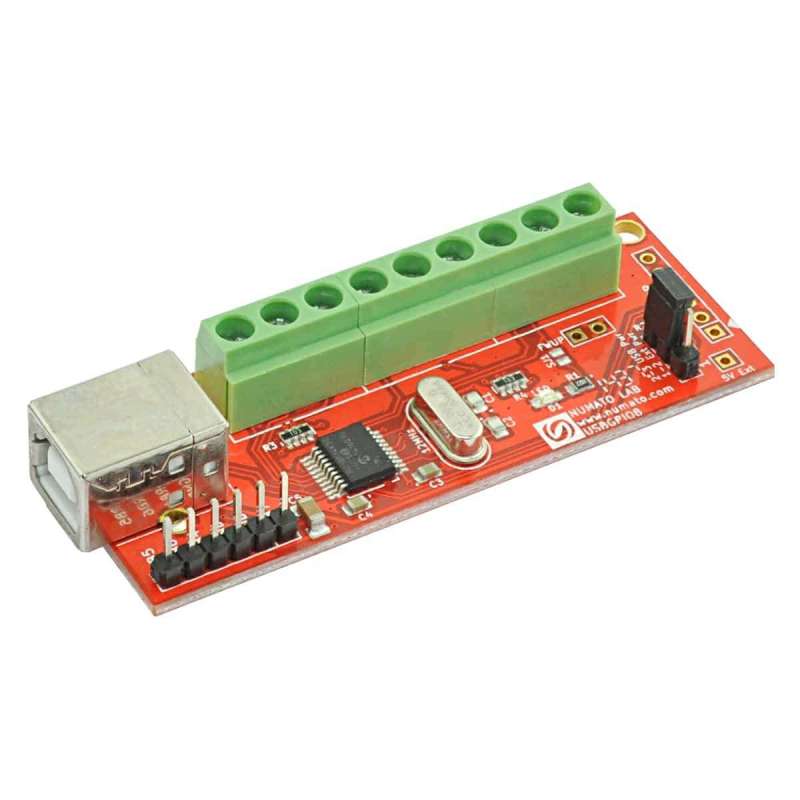

RLX COMPONENTS s.r.o. , Electronic Components Distributor.
RLX COMPONENTS s.r.o. , Electronic Components Distributor.
8 Channel USB GPIO Module With Analog Inputs (NU-GP80001)
Numato Lab's 8 Channel USB GPIO Module helps connecting real world devices to your computer easily through USB. No USB specific knowledge is required to set up and use this module. Numato Lab's GPIO devices provide an interface that looks like a Serial Port on your Operating System and thus effectively hiding the complexity of USB. All that you need to operate GPIOs is a standard Serial Terminal Emulator such as HyperTerminal/Teraterm or your favorite programming language such a C/C++, Python, Perl etc… Besides providing standard General Purpose IOs, this product has multiple Analog Inputs as well. These Analog inputs can be used to read Analog quantities such as temperature, pressure etc.. with the help of appropriate sensors.Product SKU – GP80001
Features
Applications
Supported operating systems
Why Numato Lab’s 8 Channel USB GPIO module With Analog Inputs?
Building computer or Smartphone controlled devices wasn’t always the easiest thing to do. Specialized knowledge in hardware and software were often needed to get even simplest of the things done. But what could you do if you can control devices from your Windows/Linux/Mac/Android device in less than five minutes? The possibilities are unlimited. Build a computer controlled security system, an automated test fixture, a computer controlled garage door and much more with Numato Lab’s USB GPIO devices!
Numato Lab’s USB GPIO devices are designed to help customers to get started very easily and keep everything as simple as possible even when building complex systems. This goal is achieved by a few carefully designed features below.
Numato Lab’s USB GPIO devices present themselves to the Operating System as a serial port. This means all the complexity related to USB are abstracted out and you will be using the device as if it is a simple serial port. This serial port interface can be accessed using a standard Serial Terminal Emulator software such as HyperTerminal, Teraterm, PUTTY or through your own custom script or application that can be written using one of more than a dozen different programming languages. On Windows the device will be visible in the Device manager as a normal serial port. On Linux and Mac, the device will be listed under /dev directory, usually with a name in the format ttyACMx. On Android, the device can be enumerated and controlled using packages provided by Android such as UsbManager, UsbDevice, UsbConfiguration, UsbDevice, UsbInterface etc…
Numato Lab’s USB GPIO devices support simple and human readable commands to control the device (For example, command “gpio on 1” will turn ON GPIO1). These commands can be manually typed in through a standard Serial Terminal Emulator such as HyperTerminal or Teraterm and can also be sent from a custom application or script. Custom applications or scripts can be used to automate the interaction with the device and implement logic such as conditional device control based on input values or timer etc…
No product specific libraries or APIs
Unlike many other USB GPIO devices, Numato Lab’s GPIO devices does not depend on any third party library of API. The device can be accessed by using the serial port access APIs natively provided by the Operating System where available. That being said, libraries do exist on many platforms that may make accessing devices easier. But their use is fully optional.
Large number of supported programming languages
If the particular language of your choice supports serial ports, it should be possible to use that language to write custom script or application on an Operating System that support USB Serial Ports. Currently Numato Lab’s GPIO devices are tested on different Windows version, Linux, Mac and Android. A script or application can be written using but not limited to C, C++, Visual Basic, Java, C#, AutoHotkey, VBA (MS Excel, MS Word etc…), Node.js, Autoit, Labview, Perl, Java (Android) etc..